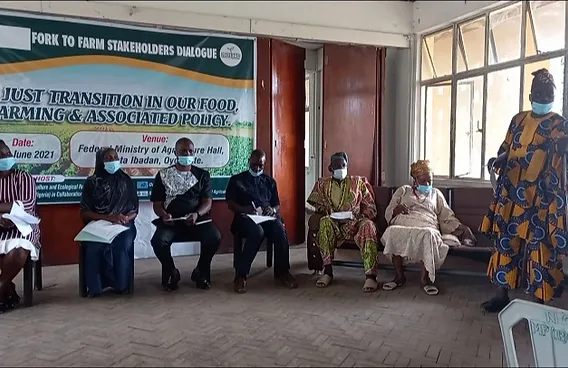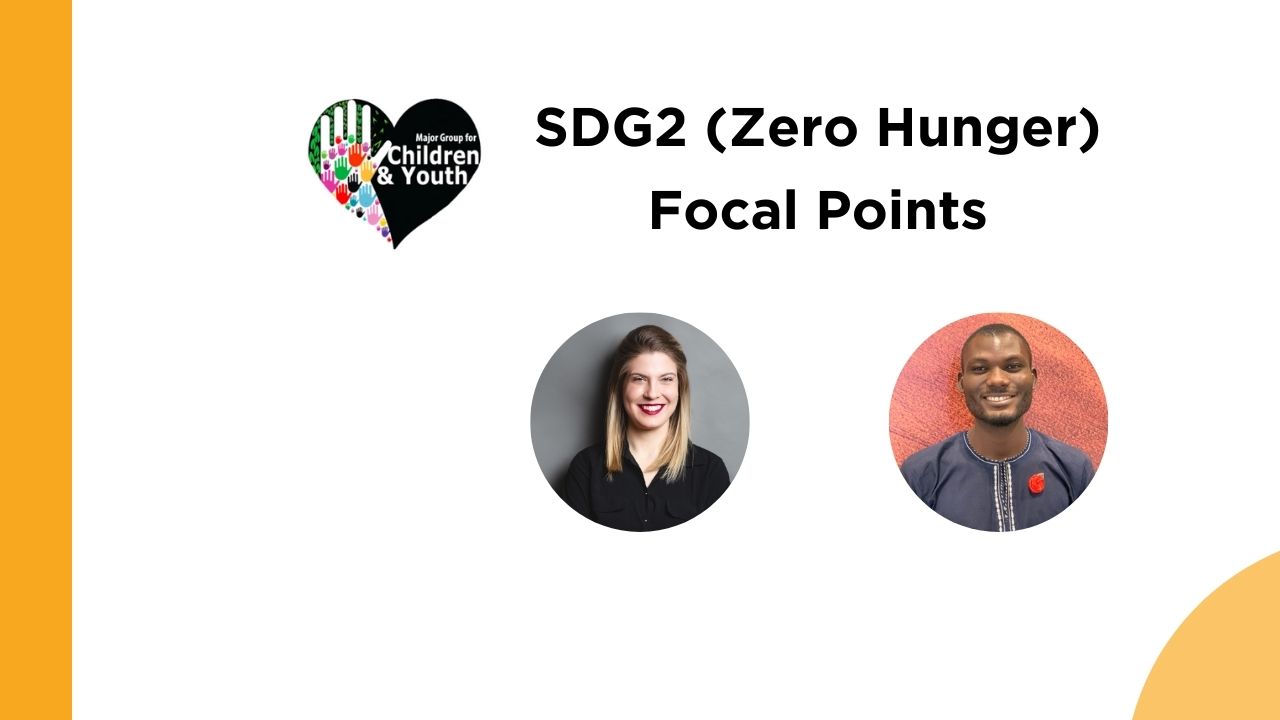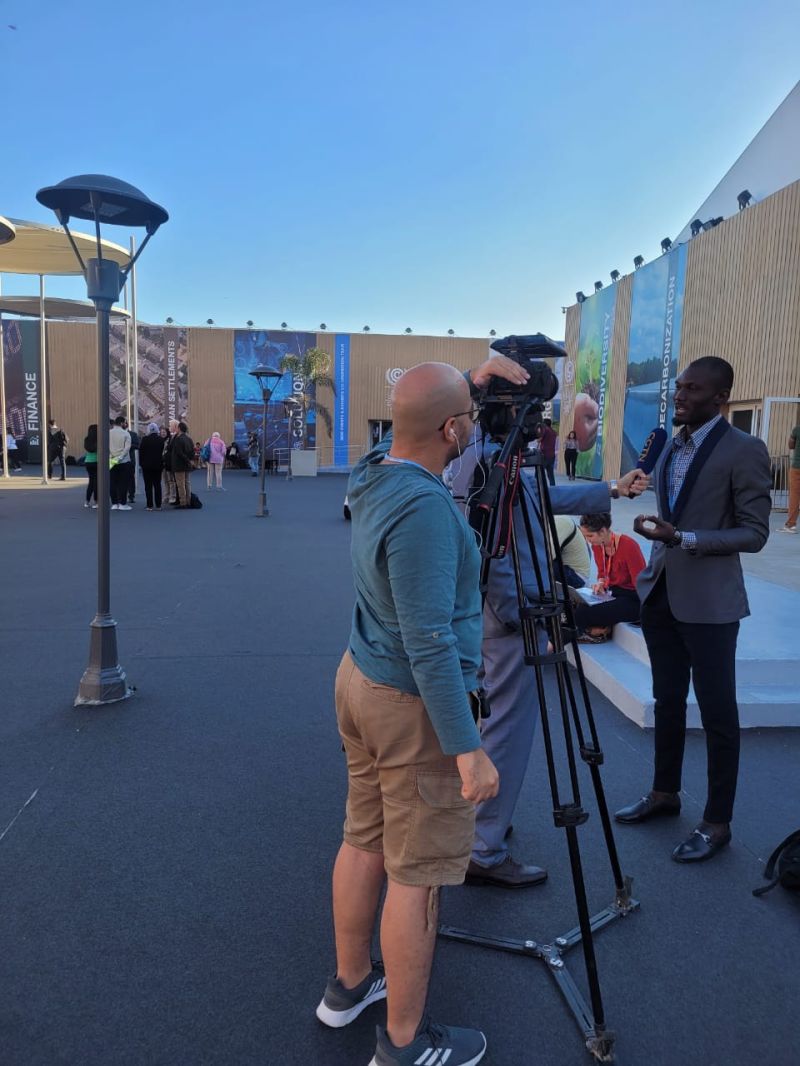The Fork to Farm Dialogue in Nigeria took place from March to September 2021 and was coordinated and facilitated by Elujulo Opeyemi and his team as part of the Youth in Agroecology and Restoration Network.
The first stage of the project consisted of building relationships with farmers and government representatives. Initially, Elujulo did not feel farmers trusted him or his organisation. The farmers thought that they were “one of these people who have worked with them before, individuals or governments who make promises and then don’t deliver…so they didn’t want to speak to us… they told us we should just go away.” But Elujulo and his team kept “coming to their meetings, listening and sharing their own knowledge” and through this trust was built.
Once relationships with individual farmers had been established, Elujulo organised a dialogue to strengthen connections and “understand their individual perspectives to challenges and opportunities available” in the context of food and climate change. Food producers from different types of farming systems were involved, including livestock and fish farmers as well as crop growers.
Simultaneously, Elujulo involved government officials. Elujulo reflects that “the best we can do is just to be persistent with the invites and to invite as many as possible.” He held a meeting with representatives from the Federal and the State Ministries of Agriculture, the Honourable Chairman, House Committee on Agriculture and Rural Development and other stakeholders. The aim was to understand existing food and farming policies; highlight the need for sustainable agriculture and to share his discussions with farmers. Having separate preparatory conversations was critical to the success of the dialogue. “Our approach enabled us to document a base for the discussion at the main dialogue to build on.”




Representatives of cities, farmers, research institutes, NGOs and others at the local dial
Picture was taken during the local dialogue, and the people in the picture includes the representatives of the federal ministry of agriculture, Oyo State chapter, representative of the Director of Institute of agricultural research and training, president of Oyo youth Agripreneur, Consultant, representative of the Director, Nigeria Horticultural research institute, Chief of farmers, and high ranking female farmers chieftain.
1/5
Really listen to the farmers, that’s where trust builds when you listen to them, really listening to them, not waiting for them to finish their speeches to tell them what to do.
The second stage consisted of bringing farmers and government representatives together. Having the time to build relationships, especially with the farmers, meant that “when the time was right for us to get them connected to the city representatives, they were ready to listen.”
However, Elujulo was disappointed that the Honourable Chairman, House Committee on Agriculture and Rural Development was not able to attend, “it would have been amazing to have him listen, seeing the faces of the farmers while they expressed their dissatisfaction and also call on better support to work together with the government for a just transition…to see the faces of the farmers because that’s how you really see the pain of the farmers, it gets to you when you see them.” Furthermore, even though other top officials from the government’s research team and from the Oyo State and the Federal Ministry of Agriculture were present, policymakers did not attend. Nonetheless, because Elujulo had invited government representatives in the food and farming sector he knew that “we had people from other departments who we know will be in the room when policymakers meet.” Additionally, Elujulo documented the conversations thoroughly so that they could be shared with those not present.
During the conversations farmers “got to share some of the best practices they have been using to address some of the challenges on their farms”, including pest and disease control as well as organic farming methods. Additionally, with farmers from the seven different local government areas in Oyo State present, the dialogue became a space for knowledge exchange. This was enhanced by the fact that different farming systems were represented, from small-scale producers to large commercial farmers. Most of these were small-scale producers. Elujulo thinks this is due to the fact that the majority of farmers in Nigeria are small-scale farmers and that “to some extent they are the ones facing the burdens of this climate crisis and would always love to attend opportunities that broaden their knowledge about it, since they can’t afford it.”
One thing that Elujulo had to consider was the existing conflict between crop farmers and herdsmen. Due to the encroaching Sahel desert, a process exacerbated by climate change, pastoralists migrate further to find food for their cattle and at times the cattle feed on farmers’ crops, creating tension between them. Taking this into account, they structured the dialogue in such a way that everyone was treated as equals:
“Before the dialogue [we] said that this is a platform and all ideas that are relevant, and what we’re looking to see is to see how we can work together. And it’s not a competition of what is right and what is not right. But a platform for people to freely express themselves.”
Overall, Elujulo was happy with the dialogue. “Farmers are willing to work with government representatives to see how we can transform the food system, as long as they’re also ready to work with them” and the government is paying “attention to what the farmers said.” Furthermore, several farmers have contacted Elujulo to find out what happens next. This motivates him to use findings from the dialogue to influence local and national policy. He hopes to establish a platform for experiential learning including agroecological training, organic fertiliser production, waste management and forestry, coupled with activities to engage “political leaders to see how the adoption of these best practices can be incentivized and also really encourage farmers to do more”. They are also planning to set up a community seed bank for their indigenous seeds to “conserve the cultural value and taste of forgotten meals.” This is a direct result of concerns raised in the dialogue in relation to seed accessibility, reusability and affordability.




